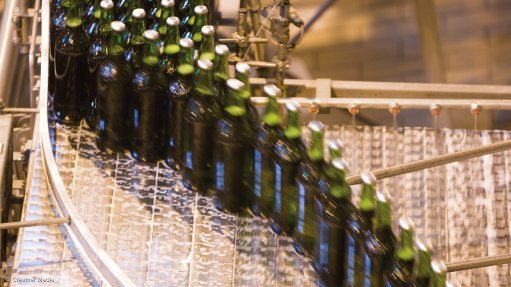
Beverage producer South African Breweries (SAB) has launched its first environmental, social and governance (ESG) strategy, and will release its first Global Reporting Initiative-compliant ESG report in November.
Speaking at the launch of the SAB ESG strategy in Johannesburg on September 28, SAB corporate affairs VP Zoleka Lisa said the company’s ESG strategy was built around eight strategic priorities: climate action; water stewardship; entrepreneurship; diversity and inclusion; circular packaging; smart agriculture; responsible consumption; and ethics and transparency.
However, while all eight categories were important, the company had chosen water, energy and jobs as its key areas of primary focus in South Africa.
SAB’s holding company Anheuser-Busch (AB) InBev sustainability manager Alyssa Jooste highlighted some of the company’s ongoing efforts to preserve water in high-stress areas of South Africa, with projects implemented in Polokwane, Nelson Mandela Bay, George, Caledon and Cape Town.
She highlighted a project in George which involved the regular clearing of alien vegetation which saved about nine-billion litres of water a year, creating jobs in the process. Another project was the Polokwane Municipal Water Conservation and Water Demand Management Project, which aimed to reduce water demand and losses in the area.
In terms of energy, SAB procurement director for Africa Kyle Day explained that, to date, all seven of SAB’s breweries in South Africa had operational on-site solar photovoltaic (PV) to supplement energy use.
Efforts are under way to upgrade and maximise the potential of these installations, given recent amendments to generation licence requirements. SAB is also exploring off-site solar PV opportunities.
Meanwhile, the Alrode brewery has an on-site biogas combined heat and power plant.
“Brewing is a continuous process that requires 24-hour demand for electricity and biogas has the potential to produce energy 24 hours a day, which is in line with our demand profile,” Day said.
Moreover, SAB has signed a power purchase agreement for off-site biogas with biogas company Bio2Watt. The off-site biogas plant will use manure from one of South Africa’s largest dairy farms, with a mix of other organic wastes, to produce renewable energy.
The electricity will be supplied to SAB from the Cape Dairy Biogas Plant, through the national grid, once it reaches commercial operation.
“With our new Cape Dairy biogas plant, in partnership with SAB, we will be removing about 500 t/d to 700 t/d of organic waste from the environment that would otherwise go to landfill, which is in line with government's strategy to reduce the amount of organic waste that is going to landfill,” Bio2Watt executive director Keziah Jooste pointed out.
The 7 MW plant will be built in the first quarter of next year and will generate about 61 GWh/y.
“You could power a few thousand homes with that energy,” Jooste said.
AB InBev entrepreneurship manager Barbara Copelivic highlighted the company’s focus on social integration and supporting small businesses as part of its ESG strategy.
In 2021, the SAB Foundation supported 5 296 small businesses across its value chain. More than R534-million has been deployed by the foundation in grant funding, business development support and interest-free loans from 2015 to this year.
“We want to be kept accountable for integration and we want to see growth in the businesses that we support. We have three areas where we support small businesses: we support retailers, we support farmers and we support social innovators.
“Those are people we work with on a daily basis and they are the cornerstone of the township economy. They are the cornerstone of rural economies,” Copelivic said.
Speaking at the event, Department of Forestry, Fisheries and the Environment chemicals and waste management deputy director-general Mamogala Musekene commended SAB’s efforts but pointed out that not enough was being done by the private sector in general to protect the environment and combat climate change.
“We want to move beyond voluntary action. We want mandatory action. This is why the Climate Change Bill is being put through Parliament,” she said.
The Bill is currently under consideration by the National Assembly.